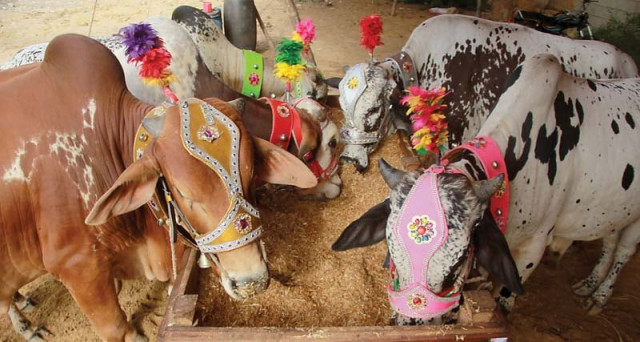Tick-ing bomb: Congo virus claims another life
This is sixth case of tick-borne disease in the country and second in Sindh, says health official

Animals at the cattle market are vulnerable to Congo virus but people are either unaware or uncaring of the problem. Precautions must be taken to prevent buyers from getting infected with the disease. PHOTO: ATHAR KHAN/EXPRESS
The victim, identified as 49-year-old Islamuddin, was diagnosed with Congo virus and admitted to Sindh Employees Social Security Hospital, near Nipa Chowrangi.
An official of the health department, Dr Syed Zafar Mehdi confirmed the death on Monday. It is the sixth case of Congo virus in the country and the second case from Sindh, he said.
A doctor and cattle-handler from Bahawalpur and an Afghan national have died in different hospitals in Karachi within a month.
The deadly virus can spread in the metropolis at any time and threaten the lives of residents if not handled with proper care, he added.
According to assistant professor of the infection control committee, Aga Khan University Hospital, Dr Faisal Mahmood, the hospital's laboratory has detected over 40 cases of the Congo virus since January this year.
Speaking about the symptoms of the virus, he said it causes high grade fever with nose and gum bleeding as well as liver and kidney failure. A medicine to prevent the virus can be provided to people, however, if a person is infected with the virus he or she is incurable, he added.
Scare and prepare
The threat of virus spreading forced the government to ensure safety of the residents especially with sacrificial animals being brought to the city. According to experts, cattle and animal handlers are the most vulnerable to the virus.

The health department has already issued an advisory to all the relevant departments such as district administration and livestock and husbandry to regularly spray the sacrificial animals, informed Mehdi.
"People are less concerned in taking precautions to avoid the horror of the Congo virus," he remarked. People must take precaution while visiting cattle markets and minimise contact with animals, he said, adding that they must wear gloves, masks, socks and light-coloured clothes to avoid catching the disease. This was also reiterated by Dr Mahmood. He explained that light-coloured clothes help identify the ticks.
Speaking about the precautionary measures, Dr Mahmood said that inflected blood of sacrificial animals can affect people and suggested covering the face while culling the animal. He stressed the need to protect the eyes and mouth from the animal's blood.
On August 18, a team of veterinarians and paramedical staff were stationed at the market in Sohrab Goth by the Sindh livestock and animal husbandry department, after almost two weeks since the market was set up. The team comprises 17 veterinary officers and 16 paramedical staff and stock assistants.
Dr Madan Lal, speaking on behalf of the market's doctors, said all the cattle herders had already vaccinated their animals before transporting them to Karachi. "Currently, we have been deputed to treat ailing animals or those injured during transportation animals," he said. He claimed that all the cattle herders had vaccinated their cattle before transporting them to the city. No animal can be vaccinated at this point since the incubation period of the vaccine is 21 days, he added.
Published in The Express Tribune, August 30th, 2016.



















COMMENTS
Comments are moderated and generally will be posted if they are on-topic and not abusive.
For more information, please see our Comments FAQ